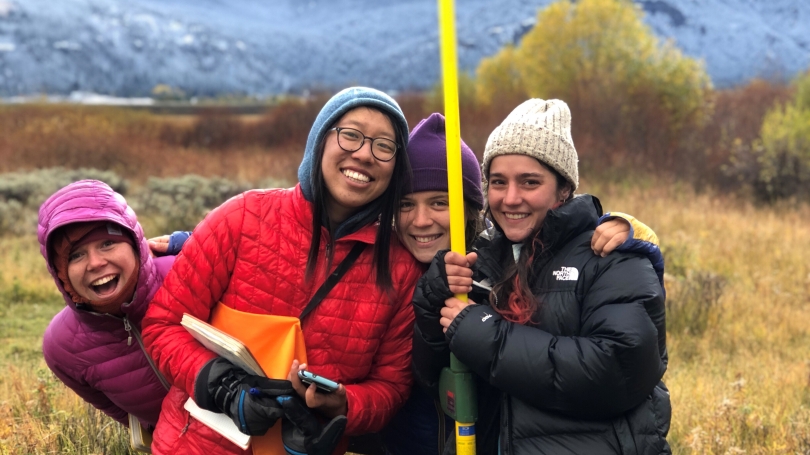
Stretch Students Survey fault scarps in WY
- Undergraduate
- Graduate
- Research
- The Stretch
- Inclusivity
- News & Events
- People
Back to Top Nav
Back to Top Nav
Back to Top Nav
Back to Top Nav
Back to Top Nav
The Stretch program is open to all Dartmouth undergraduates who have taken at least one of the Department of Earth Sciences' prerequisite introductory courses (EARS 1, 2, 3, 5, 6, 8, or 9), as well as EARS 40 (Materials and Structure of the Earth), which is offered in the summer term. Priority for enrollment on the program is given to declared EARS or EARV majors. Students usually enroll in the Stretch during the fall term of their junior year with applications being due in February of their sophomore year.
The Stretch program is typically offered every fall term.
Program Format: The Stretch is divided into a series of segments, each taught by one or more Earth Sciences faculty. Each segment takes place in a different location and is approximately one to two weeks in duration.
Segments and Their Locations:
Duration of the Program: The program typically runs from the first week in September to the second week in November.
Enrollment: We generally have between 20 and 25 students on the program per year.
Lodging: Lodging consists of research stations, hotels/motels, and guest ranches. Some segments also involve staying at established campgrounds. Tents are provided by the Department of Earth Sciences when needed.
Food: Food is provided by the Department of Earth Sciences for the duration of the Stretch Program. Some meals are cooked by our group, while others are either purchased independently by students through a per-diem stipend or provided by our lodging arrangements. We can accommodate most dietary restrictions.
Transportation: Students fly into and out of the program from their homes or the Dartmouth College campus. All transportation during the program is facilitated through the Department of Earth Sciences' 12-passenger Ford Transit vans.
Accessibility: We encourage all students to apply to the Stretch program. You do not need to have any previous experience in the outdoors. Students should note that aspects of the Stretch can be physically demanding. Many days on the program involve traveling over rough ground for distances greater than 2-3 miles. Please contact Ed Meyer or Student Accessibility Services with questions regarding accessibility.
Financial Aid: Aid is available for the Stretch program (including to help cover the cost of travel and field gear). The calculation of financial aid is unique to each student, and each individual is encouraged to meet with the Financial Aid Office.
Program Cost: The program cost is similar to a standard term at Dartmouth. Costs include tuition, room and board, and some field gear if you do not already own it. Details can be found here by navigating to the budget worksheet.
Safety: All graduate students and most faculty on the program have current Wilderness First Aid and CPR certification. We have safety plans for site visits and we carry an InReach SOS device and satellite phone with us at all times. Students receive safety training over the summer term before the Stretch program starts and safety discussions occur before the start of each field day.
Research Opportunities: For many students, the Stretch experience provides intellectual stimulus and connection with individual faculty members that ultimately lead to a senior or Honors thesis project.
Where can I get more information?: For more information, please contact Edward Meyer and visit the Guarini Institute's Stretch Webpage. Please note that the program is only open to Dartmouth College students.
When and Where to Apply: For information about deadlines and to view the application, please click the "Apply to this Program" button here.